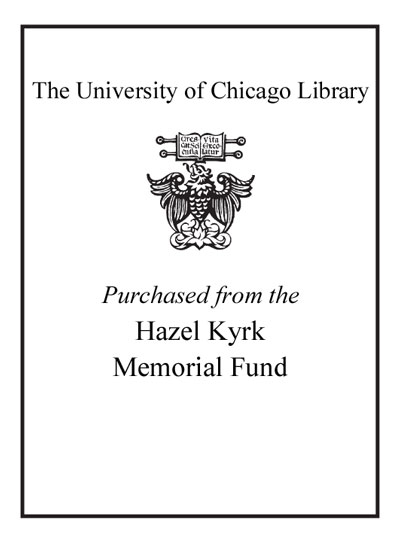Addictive consumption : capitalism, modernity and excess /
Saved in:
| Author / Creator: | Reith, Gerda, 1969- author. |
|---|---|
| Imprint: | Abingdon, Oxon ; New York, NY : Routledge, 2019. |
| Description: | xi, 177 pages : illustrations ; 25 cm |
| Language: | English |
| Subject: | |
| Format: | Print Book |
| URL for this record: | http://pi.lib.uchicago.edu/1001/cat/bib/11721369 |
Table of Contents:
- List of images
- Acknowledgements
- Introduction: consumer capitalism and addiction
- Consumer capitalism: identity, desire and excess
- Consumption and its discontents
- Addiction and the commodity
- Outline of the book
- Part I. The shifting problem of consumption
- 1. Luxurious excess: the emergence of commodity culture
- Introduction
- The emergence of commodity culture
- 'Psychoactive revolutions': colonialism, drug foods and power
- Mercantilism and slavery
- The trickle down of 'infinite desire'
- The dualism of consumption: respectability and luxury
- Consumption, luxury and excess
- 'A Chinese drug called tea'
- Coffee and tobacco: a 'eunuch's drink' and a filthie noveltie'
- From aqua vitae to Gin Lane
- Luxury, contagion and addiction
- Stimulating commodities and the spirit of capitalism
- Productive consumption: sugar
- 'Private vices, publick benefits': the transformation of luxury
- End points
- 2. Industrial modernity: the birth of the addict
- Introduction
- The nineteenth century: 'addictive modernity'
- Addiction: disease of the will
- 'The great technology of power'
- The habits of the population: opium and the addicted 'others'
- Ethnicity: 'racialised others'
- The disciplining of the will
- The birth of the addict
- End points
- 3. Intensified consumption and the expansion of addiction
- Introduction
- The spread of consumerism.: desire and excess
- Intensification, identity and desire
- Freedom and governance
- The expanding landscape of addiction
- From diseased wills to diseased brains: the rise of addiction neuroscience
- Diagnosing desire
- Making up addictions
- Addiction as metaphor
- Disordered identities and the proliferation of addictions
- Risky subjects
- End points
- Part II. Addictive consumptions: drugs, food, gambling
- 4. Drugs: intoxicating consumption
- Introduction
- Intoxication and governance
- Discipline and punish
- Commodification, normalisation and the spread of intoxicating environments
- Commodifying Ecstasy
- Cannabis:from the counterculture, to the mainstream
- Drugs 2.0: legal highs
- Alcohol and the night-time economy
- Denormalisation and new forms of governance
- The governance of space and the mobilisation of morality
- The 'blacke stinking fumes' of smoking (and vaping)
- The binge drinkers of Gin Lane
- End points
- 5. Food: embodied consumption
- Introduction
- 'Big Food': overabundance, excess and waste
- Producing excess
- The manufacture of desire: craving and bliss
- Marketing junk
- Obesity, addiction, risk
- Addiction and mental disorder food and neurochemical selfhood
- Food addiction: this is your brain on sugar
- The governance of consuming bodies
- Bodies in culture
- Bodies and brains
- The normalising logic of public health
- Technologies of the self: 'discipline is liberation'
- The hidden despotism of food
- Metaphorical bodies
- Obesity: excessive bodies
- Anorexia: regulated bodies
- Bulimia: wasteful bodies
- End points
- 6. Gambling: dematerialised consumption
- Introduction
- The gambling state
- Intensified consumption and the spread of aleatory environments
- Mobile and social: the new gambling landscape
- Poor gamblers
- The neurobiology of chance: risky technologies and addiction
- Neuroscience: the ghost in the (gambling) machine
- DSM-5 and the risky subject
- Governing risk
- Rage against the machine
- Dematerialised consumption and the disorders of chance
- End points
- Afterword
- The shifting problem of consumption
- The contradictions of consumer capitalism
- Trajectories of excess
- Problematic pleasures
- Bibliography
- Index

